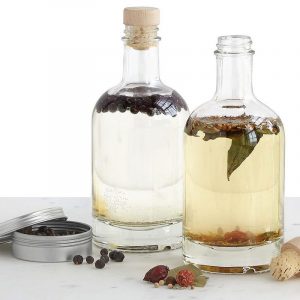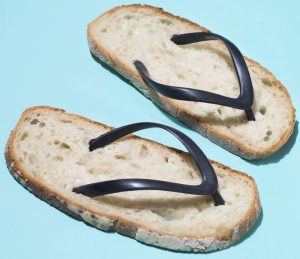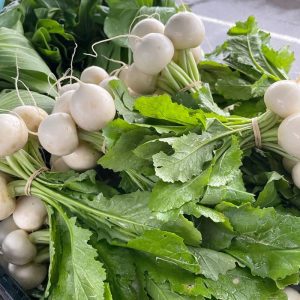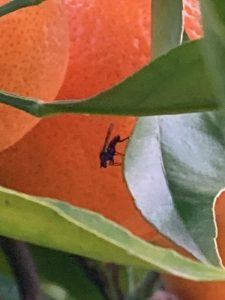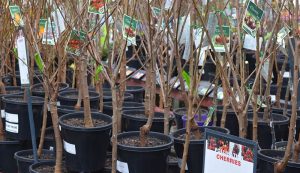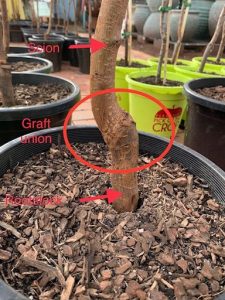Thanks to the people who have contributed to this week’s newsletter: Ann Stanley, Gayle Parkes, Hong Van Pham, Judith Chivers, Marcela Santos, Megan Goodman, Nathacha Subero, Robin Gale-Baker, Tania Rostan and Vicki Jordan.
Begin your Queensland Fruit Fly prevention strategy now! (by Robin Gale-Baker)
Now is the time to begin your campaign against Queensland Fruit Fly (QFF). Don’t delay! This pest is the scourge of fruit and vegetable growers throughout the northern suburbs and without doubt will extend its reach this season. The good news is that, after a number of years trying to achieve QFF free fruit and veggies, the Sustainable Macleod Community Garden did so last season. QFF was present – caught in lures and traps – but no produce was infested.
Here’s how it was done:
- August: all leftover fruit still on trees was removed (excluding citrus).
- August onwards: Wild May lures were placed in fruit trees. The males are attracted to these and indicate the presence of QFF. Check them weekly and top them up.
- September onwards: Ceratraps were hung in trees. Ceratraps are a protein trap that attracts males and females. Ceratraps last 3-4 months depending on climate before needing replenishment. Check them weekly to see if you have caught any QFF.
- September onwards: the temperature at sunset was monitored. QFF mate at sunset when it is 16degC or warmer. When this temperature occurs, it is an indicator that QFF may soon emerge and lay eggs.
- As soon as flowers on fruit trees were pollinated by bees and other pollinators, the trees were netted with 2mm x 2mm insect netting which was weighted down around the hem. This included all citrus. All vegetables were netted when planted as most are self-fertile, and weighted down around the hem. (It may be necessary to hand pollinate eggplant, chillies and capsicums).
- Any fallen fruit was microwaved and disposed of in the waste bin twice weekly. None was put in the compost!
At Sustainable Macleod, we favour netting as our primary strategy. If QFF cannot get to the produce then they cannot harm it. We use the lures and traps as back-up and as indicators of whether or not QFF is actually present.
Mistakes that we made early-on included: not weighing down the netting to prevent QFF from crawling under it; not netting early enough or not netting everything; pulling out spent plants with fruit on it, say chillies, at the end of the season, and not disposing of it straight away or exposing it in compost where QFF could then lay eggs in it; and not checking lures and traps despite our good intentions.
Starting early and being vigilant are the keys to success. You will not see any damage until you cut open ripe fruit or veggies so damage may be occurring right under your nose. Given the time and money, we expend on our edible gardens, executing a strategy to protect our produce makes sense, and we can succeed even if our neighbours are failing.
Where to obtain supplies:
- Supplies are surprisingly hard to buy locally. As a service to the community, Sustainable Macleod sells Wild May, lure bottles and netting at cost price. Go to our shop to purchase.
- Ceratraps can be bought online in bulk quantities so join together with friends to share the cost. The cheapest way to purchase is to buy 5 litres and 20 traps for around $210. Google Ceratraps and look for the best deal.
- Netting can be purchased from some nurseries, including Bulleen Art and Garden. It is typically 6 metres wide and about $5 per metre. Avoid buying packaged netting, which is too narrow to do the job.
A final note: make sure that any product you buy is specific for QFF and not just fruit fly. There are a number of ‘fruit fly’ products on the market, especially sticky traps, that do not contain the pheromones which attract QFF and are therefore a waste of money and will not support your efforts to be QFF free.
Reservoir, Rezzadent, Wilam-nganjin and fufu
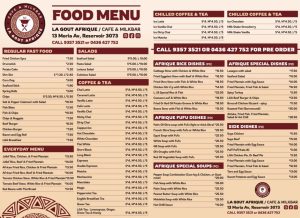
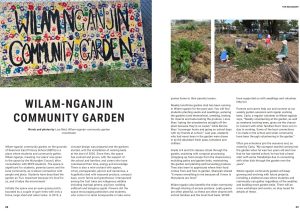 The Rezzadent is a bi-monthly (i.e. once every two months) publication aimed at residents of Reservoir. It is an interesting read, in part because it doesn’t contain any adverts.
The Rezzadent is a bi-monthly (i.e. once every two months) publication aimed at residents of Reservoir. It is an interesting read, in part because it doesn’t contain any adverts.
The latest edition contains a two page article about the Wilum-nganjin Community Garden in Reservoir (see graphic near right).
Another article that caught my eye was about a new west African cafe called La Gout Afrique. One of their specialities is called ‘fufu’ and it is apparently one of the most famous west African ‘swallow’ foods. ‘Swallow’ foods are dough-like creations which you meant to eat without chewing. Rather, they are an accompaniment to soups/stews which you use to scoop up the soup/stew. Read more.
Intrigued, I decided to go to La Gout Afrique and sample their fufu. From the 5 fufus on their menu (see graphic far right), I chose ‘egusi soup with fufu’, where (according to Wikipedia) egusi are ground melon seeds. As you can imagine, the taste was unusual. The act of swallowing without chewing (which took some discipline) made it even more unusual. It’s definitely something that you should do at least once.
13 Moira Avenue, Reservoir. Open Tuesday to Saturday, midday-8.45pm. One word of warning: most of the west African dishes on the menu are only available by pre-order, which means that you have to ring them in advance. 03 9357 3521 or 0436 427 752.
Can you help with a cookbook about reducing food waste?
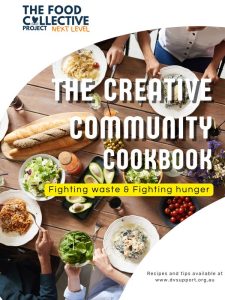 The Food Collective Project, which is based in Greensborough, are putting together a cookbook to raise community awareness around food insecurity and reducing food waste. They are looking for people to contribute any of:
The Food Collective Project, which is based in Greensborough, are putting together a cookbook to raise community awareness around food insecurity and reducing food waste. They are looking for people to contribute any of:
- Budget friendly, zero waste recipes.
- Money saving tips when grocery shopping.
- Hints on food storage.
All contributors will go in a draw to win a hamper from local market stallholders.
If you are potentially interesting in contributing, contact Marcela Santos by email (pr@dvsupport.org.au) or phone (9435 8282).
Do you know?
What to top dress garlic with?
Leaf, Root & Fruit’s July planting guide included the following statement “My garlic is establishing well. Now is the time to top dress the plants to give them more nutrients to put into bulb formation.” but didn’t elaborate. Jennie Ramage has written in to ask what should she top dress her garlic with? Send me your responses by email.
How to keep rats out?
To keep the rats out of her veggie path, Vicki Jordan is considering putting a wire fence around it. What hole size will allow bees and other pollinators in but keep rats out? Send me your responses by email.
The Melbourne ‘Local Food Connections’ community radio show
This upcoming Sunday’s episode will feature Dan Milne talking about water in living systems. Listen on 3CR (855 AM) on Sunday morning, 10-10.30am, by tuning into either the station (855 AM) or its livestream. You can also email the host, Ann Stanley, at localfoodconnectionsradio@gmail.com
Is Greasy Zoe’s the third smallest restaurant in Melbourne?
According to this article in The Age, the answer is ‘yes’, given its capacity of 8 seats. But Greasy Zoes is in Hurstbridge and is Hurstbridge really now considered to be part of Melbourne? And the second restaurant smallest on their list is in Cockatoo, which is even further away from Melbourne.
Every newsletter needs a good picture
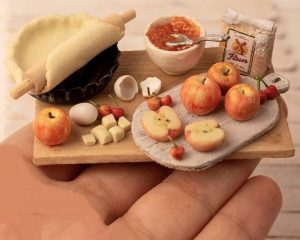 Iranian artist Mahnaz Miryani makes realistic, miniature food scenes which she then photographs. Tiny trays transport pastries, eggs, cakes and other dainty morsels. The scenes are made out of polymer clay which is hardened in the oven before being painted.
Iranian artist Mahnaz Miryani makes realistic, miniature food scenes which she then photographs. Tiny trays transport pastries, eggs, cakes and other dainty morsels. The scenes are made out of polymer clay which is hardened in the oven before being painted.
Meg’s garden this month (by Megan Goodman)
There are already hints of Spring in the jonquils flowering on the road verges and the buds on the fruit trees. The pine pollen is starting to be released in dust clouds of yellow which gather on the surface of everything. In the garden, silverbeet, Asian greens and other brassicas are doing well at the moment, particularly the senposai (which is a cross between Japanese mustard and cabbage). We are succession planting seedlings of broccoli and cabbage now. Cabbages planted in early May will be ready for harvesting next month and are perfect for overnight coleslaw.
Coleslaw
Half a green cabbage, finely shredded
1 carrot grated
1 brown onion, grated
¾ cup sugar
white pepper
The dressing:
1 cup white vinegar
¾ cup sunflower oil
1 teaspoon mustard
1 teaspoon salt
1 teaspoon celery seed
Place the cabbage in a large bowl and sprinkle with the sugar. Layer with the onion and the carrot and sprinkle with the pepper. Do not mix.
Place the vinegar, oil , mustard, salt and celery seed in a small saucepan and bring to boil. Pour over the vegetables but do not mix.
Cover bowl and refrigerate overnight. Drain well and toss before serving.
Read more of Megan’s recipes on our website.
What veggie seeds to plant in August
Here is a list (see the planting guide for more detail):
Leafy greensLettuce |
AlliumsLeeks |
Warm season veggiesCapsicum |
OtherAsparagus |
Which link was clicked most times in the last newsletter?
The most popular link in the last newsletter was the article about 15 ways to use your eggshells.
 Joke (or pun) of the week
Joke (or pun) of the week
Two children ordered their mother to stay in bed one Mother’s Day morning. As she lay there looking forward to breakfast in bed, the smell of bacon floated up from the kitchen. But after a good long wait she finally went downstairs to investigate. She found them both sitting at the table eating bacon and eggs. “As a surprise for Mother’s Day,” one explained, “we decided to cook our own breakfast.”
Regular activities over the coming week
Farmers’ and other food markets
- Friday: Community Grocer, Carlton and Farm Raiser farmgate, Bellfield.
- Saturday: Carlton, Coburg and Farm Raiser farmgate, Bellfield.
- Sunday: Alphington Eltham.
- Tuesday: Community Grocer, Fitzroy.
- next Wednesday: Really Really Free Market (Coburg).
Food swaps
- Saturday: Brunswick East.
- Sunday: Collingwood Yards.
Community gardens
- Thursday: Diamond Valley Library (Greensborough), Edible Hub (Hurstbridge), SEEDs (Brunswick) and Whittlesea.
- Friday: Reynard Street (Coburg) and West Brunswick.
- Saturday: Links (Lalor), Macleod and Thrive (Diamond Creek).
- Sunday: Bellfield, Bulleke-bek Park (Brunswick), Fawkner Food Bowls, Pentridge (Coburg) and Regent (Reservoir).
- Monday: Panton Hill, SEEDs (Brunswick) and Whittlesea.
- Tuesday: Watsonia Library.
- Next Wednesday: Bellfield, Eltham Neighbourhood House, Macleod, Newton Street (Reservoir), Span (Thornbury) and Sylvester Hive (Preston) .
Not food-related but interesting
Open Gardens Victoria upcoming gardens and events; various dates and times; mostly $10; various locations.
Open Gardens Victoria will be having numerous open gardens and other events over the rest of the year. For example, their open gardens during October include Christmas Hills, Hurstbridge, Lilydale and Wonga Park. And their upcoming online events include bird friendly gardening on Thursday, 31st August and maximum flowers for summer on Thursday, 7th September.
Upcoming face-to-face events – not cooking
Urban food gardening group (10 sessions); on Tuesdays from 1st August, midday-4pm; $112 ($3 per hour); Coburg.
Learn the foundations of growing plants by working in a fun and relaxed environment. This is a continuing program so people can join any time.
Backyard chickens; Wednesday, 9th August, 11am-midday; free; Croydon.
Claire will discuss how to care for your chickens and their housing and maintenance requirements.
Grafting workshop; two occurrences on Friday, 11th August (10am-midday and 1-3pm) and two on Saturday, 12th August (10am-midday and 1-3pm); $20; Fairfield.
Learning the reasons for, and the science of, grafting. Learn when to graft and what to graft. See examples of grafts. Then practice on some apples. Take a sharp knife if you have one. Maximum of 6 participants. Presenter: John Pinniger. Organised by Heritage Fruits Society.
Winter pruning workshop with Angelo Eliades; Saturday, 12th August, midday-2pm; suggested donation of $5-10; Coburg.
Angelo will be giving a winter pruning to deciduous fruit trees before they start blossoming. Organised by Reynard Street Neighbourhood House. Click here to read about the garden.
Gut health; Sunday, 20th August, 12.30-1.30pm; free; Richmond.
What makes your gut healthy and happy? Dr. Peter Johnston has expertise in the prevention, treatment and reversal of chronic diseases through the use of whole foods. Organised by Green Karma.
Getting to know bush tucker; Saturday, 9th September, 11am-12.30pm; $20; Ivanhoe.
Hayden Marks, from Melbourne Bushfood, will discuss the versatility and benefits of bush food. You will be able to taste some of these foods as well as learn how our indigenous peoples used them for food and medicine. You’ll also learn how to incorporate these ingredients into your everyday meals.
Wicking bed workshop; Sunday, 10th September, 2-3.30pm; $15; Macleod.
Learn the how and why of wicking beds, including detailed explanation and notes on how to put together these water-saving, high-cropping beds. Presenter: Paul Gale-Baker. Organised by Sustainable Macleod.
Wine and Vine Festival; Saturday, 16th September, midday-7pm; $58; Abbotsford.
There will be around 20 wineries plus live music and food. The ticket includes unlimited tastings for a 3-hour period plus a tasting glass.
Spring veggie garden design and planting; Sunday, 17th September, 10am-1pm; $165 ($55 per hour); Mount Evelyn.
The topics to be covered will include: soil preparation (e.g. soil testing, pH balancing, organic matter incorporation, soil amendments); plant selection and placement (e.g. sunlight requirements and plant heights); planting techniques and timings (e.g. transplanting vs and direct sowing); succession planting; companion planting; propagation methods (e.g. seed saving, division, cuttings and grafting); pest and disease management (e.g. organic pest control methods and early detection and prevention measures); and preparing for the warmer months (e.g. watering and irrigation practices and summer heat protection. Presenters: The Edible Garden and Fence. Organised by The Food School Yarra Valley.
Beeswax wrap workshop; Tuesday, 19th September, 2.30-4.30pm; free; Nunawading.
Learn how to make and maintain beeswax wraps for keeping food fresh and hygienic without the use of single-use plastics such as cling-wrap. Whitehorse and Manningham residents only.
Beeswax wrap workshop; Wednesday, 20th September, 2.30-4.30pm; free; Doncaster.
Learn how to make and maintain beeswax wraps for keeping food fresh and hygienic without the use of single-use plastics such as cling-wrap. Whitehorse and Manningham residents only.
In July
- Continuous hot composting; Saturday, 29th July, 9am-midday; $21 ($7 per hour); Preston.
- Composting 2-ways; Saturday, 29th July, 10-11.30am; $25 ($16 per hour); Kinglake.
- The fungus amongst us; Saturday, 29th July, 10am-12.30pm; $60 ($24 per hour); Alphington.
- How to become self reliant workshop; Saturday, 29th July, 10am-1pm; $165 ($55 per hour); Mount Evelyn.
- Introduction to permaculture (2 sessions); Saturdays 29th July and 5th August, both 10am-3pm; $150 ($15 per hour); Coburg.
- Autoimmune disease; Sunday, 30th July, 11am-12.30pm; free; Richmond.
- Backyard beekeeping basics; Sunday, 30th July, 11am-1pm; $80 ($40 per hour); CERES.
- Permaculture design information session; Monday, 31st July, 6-8pm; free; Ringwood.
In August
- Urban food gardening group (10 sessions); on Tuesdays from 1st August, midday-4pm; $112 ($3 per hour); Coburg.
- Rod Heather on growing and grafting fruit trees.; Tuesday, 1st August, 7.15-9.15pm; $4; Hurstbridge.
- Community soup night; Wednesday, 2nd August, 4.30-7.30pm; free; Preston.
- Garden design with Kat Lavers; Wednesday, 2nd August, 6.30-8.30pm; free; Doncaster.
- Composting workshop; Friday, 4th August, 10-11am; free; Box Hill South.
- Grafting and tree sales day; Saturday, 5th August, 10am-midday; free; CERES.
- Winter fruit tree pruning with Chris England; Saturday, 5th August, 10am-1pm; $70 ($23 per hour); Richmond.
- Urban wine walk; Saturday, 5th August, midday-4pm; $82; Brunswick.
- Mushroom farm tour; Saturday, 5th August, 2-2.30pm; $27 ($54 per hour); Alphington.
- The how-to of worm farming with Felicity Gordon; Saturday, 5th August, 2-3.30pm; $15; Macleod.
- Permaculture Design Course (100 hours); mostly Wednesday evenings, starting 5th August, 6.30-9.30pm; $2,200 ($22 per hour); CERES.
- Grafting and tree sales day; Sunday, 6th August, 10am-midday; free; Templestowe.
- How to drink Australian (book launch); Monday, 7th August, 6-9pm; $30 ($10 per hour); Abbotsford.
- Backyard chickens; Wednesday, 9th August, 11am-midday; free; Croydon.
- Grocery bill savings workshop with Open Table; Wednesday, 9th August, 4-5pm; free; Carlton.
- Care of backyard chickens; Thursday, 10th August, 11am-midday; free; Greensborough.
- Grafting workshop; Friday, 11th August, 10am-midday; $20; Fairfield.
- Grafting workshop; Friday, 11th August, 1-3pm; $20; Fairfield.
- Grafting workshop; Saturday, 12th August, 10am-midday; $20; Fairfield.
- Winter pruning workshop with Angelo Eliades; Saturday, 12th August, midday-2pm; suggested donation of $5-10; Coburg.
- Urban wine walk; Saturday, 12th August, midday-4pm; $82; Brunswick East.
- Grafting workshop; Saturday, 12th August, 1-3pm; $20; Fairfield.
- Pruning workshop; Saturday, 12th August, 2-4pm; $20 ($10 per hour); Templestowe.
- Intro to composting; Sunday, 13th August, 10.30am-12.30pm; $21 ($10 per hour); Preston.
- SEEDs Soup Festival; Sunday, 13th August, 11am-5pm; free; Brunswick.
- Permaculture Design Course (10 sessions); Tuesdays 9am-3pm, 15th August to 10th October plus some Saturdays; $595 ($9 per hour); Ringwood.
- Grow your own mushrooms; Thursday, 17th August, 6.30-9.30pm; $160 ($53 per hour); Collingwood.
- Collectors whisky tasting with Craig Molyneux; Thursday, 17th August, 7-9pm; $97 ($49 per hour); Abbotsford.
- DIY mushrooms; Sunday, 20th August, 10am-4pm; $175 ($29 per hour); CERES.
- Gut health; Sunday, 20th August, 12.30-1.30pm; free; Richmond.
- Kat Lavers on permaculture; Wednesday, 23rd August, 8-10pm; free; Preston.
- Introduction to worm farming; Thursday, 24th August, 7-8pm; free; Mill Park.
- Edible weeds walk; Saturday, 26th August, 10.30am-12.30pm; $30 ($15 per hour); Coburg.
- Edible weeds walk; Saturday, 26th August, 1.30-3.30pm; $30 ($15 per hour); Coburg.
In September
- Complete urban farmer (14 sessions); weekly sessions starting Friday, 1st September, 9am-3pm; $895 ($11 per hour); CERES.
- Edible weeds; Saturday, 2nd September, 10am-midday; $60 ($30 per hour); CERES.
- In-depth mushroom cultivation workshop; Saturday, 2nd September, 10am-4pm; $149 ($25 per hour); Alphington.
- Growing mushrooms at home; Saturday, 2nd September, 10.30am-1pm; $135 ($54 per hour); Alphington.
- Home composting for beginners; Saturday, 2nd September, 2-3.30pm; free; Edendale.
- Introduction to beekeeping (2 sessions); Saturday, 2nd September, 9.30am-4.30pm and Saturday, 9th September, 10.30am-12.30pm; $225 ($25 per hour); Blackburn North.
- Weed walks with Miranda; Sunday, 3rd September, 9am-midday; $60 ($20 per hour); Mount Evelyn.
- Basic inoculation workshop; Sunday, 3rd September, 10am-midday; $87 ($44 per hour); Alphington.
- Resin art with ink – cheese platter (2 sessions); Monday, 4th September, 7-9pm and Tuesday, 5th September, 7-8pm; $95 ($32 per hour); Mount Evelyn.
- Tomato master class with Penny Woodward; Wednesday, 6th September, 6.30-8.30pm; free; Doncaster.
- Australian plants expo; Saturday, 9th September, 10am-4pm; $5; Eltham.
- DIY Beeswax wrap workshop; Saturday, 9th September, 10.30am-12.30pm; $40 ($20 per hour); Brunswick.
- Getting to know bush tucker; Saturday, 9th September, 11am-12.30pm; $20; Ivanhoe.
- Australian plants expo; Sunday, 10th September, 10am-4pm; $5; Eltham.
- Wicking bed workshop; Sunday, 10th September, 2-3.30pm; $15; Macleod.
- Julie Kos, from Kossies Free Range Egg Farm, on smoked eggs; Wednesday, 13th September, 8-10pm; free; Doncaster East.
- Complete urban farmer (14 sessions); weekly sessions starting Wednesday, 13th September, 9am-3pm; $895 ($11 per hour); CERES.
Regular events
- Beekeeping workshop; roughly once a month on Saturdays, 1-3.30pm; $85 ($34 per hour); Brunswick East.
- Carlton aperitvio food tour; every Friday, 5-7pm; $139 ($70 per hour); Carlton.
- Classic cocktails; various Tuesdays, 7-10pm; $70 ($23 per hour); Fitzroy.
- Edible Forest tours; every Friday and Saturday, 11am-1pm and again at 1-3pm; $25 ($13 per hour); Dixons Creek.
- Eltham trails (walking food tour); various Saturday mornings and Thursday evenings; $65 ($22 per hour); Eltham.
- Flavours of Coburg food tour; 3rd Saturday of each month, 10am-1pm; $65 ($22 per hour); Coburg.
- Gin making masterclass; most Saturdays, 10am-1pm; $175 ($58 per hour); Nunawading.
- Gin masterclass; most Saturdays and Sundays, midday-1pm; $80 ($80 per hour); Eltham.
- Ratio Cocoa Roasters behind the scenes chocolate factory tour; various Fridays and Saturdays; $20 ($14 per hour); Brunswick.
- Spoon carving workshop; various Saturdays and Sundays, 10am-1pm; $130 ($43 per hour); Coburg North.
- Truffle workshop at Ratio Cocoa Roasters; 3rd Sunday of each month, 11am-1pm; $75 ($38 per hour); Brunswick.
- Wine tasting masterclass; Saturdays, 3-5pm; various prices; Northcote.
Upcoming face-to-face events – cooking
Cooking with Sebastian; Saturday, 29th July, 11am-1pm; $55 ($28 per hour); Ringwood North.
Sebastian will create a roast pumpkin and curry soup with a homemade bread, which you will then eat. Organised by North Ringwood Community House.
Opera cake; Saturday, 29th July, 1.30-4.30pm; $98 ($33 per hour); Lower Templestowe.
Learn how to make this classic French dessert which features layers of almond sponge cake soaked in coffee syrup, chocolate ganache and silky smooth espresso buttercream. Organised by Living And Learning @ Ajani.
Preserved lemon workshop; Saturday, 19th August, midday-1pm; free; Macleod.
Make preserved, salted lemons using lemons freshly picked in the community garden. You will get to take a small jar of preserved lemons home. Organised by Sustainable Macleod.
Black forest cake; Saturday, 2nd September, 1.30-4.30pm; $98 ($33 per hour); Lower Templestowe.
You’ll learn how to make a moist and tender chocolate cake, whip up a fluffy cream filling, layer in the tart cherries, top it with chocolate shavings and, finally, decorate the cake with a touch of elegance. Organised by Living And Learning @ Ajani.
Halloumi cheese making, traditional ricotta and ricotta salata; Saturday, 16th September, 10am-3pm; $240 ($48 per hour); CERES.
You will learn how to make halloumi cheese, traditional ricotta and ricotta salata. You will take home what you make. Presenter: Kristen Allan.
Mozzarella making class; Saturday, 16th September, 10am-midday; $150 ($75 per hour); Thomastown.
What you will learn: the process behind producing curd; how to make hand-stretched fresh mozzarella; and how to shape mozzarella into bocconcini and trecce. What you will get: guided cheese tasting with a glass of wine; and freshly made mozzarella to take home. Organised by That’s Amore Cheese.
Cheese making; Saturday, 16th September, midday-4pm; $130 ($33 per hour); Kinglake.
Learn how to make ricotta, feta and halloumi cheese. You will make enough to take some home and also to taste test at lunch. Take along an apron, a glass jar and at least four plastic containers to take your cheese home. Organised by Kinglake Ranges Neighbourhood House.
Sourdough bread baking; Sunday, 17th September, 9am-5pm; $190 ($24 per hour); CERES.
What you will learn: how to make your own bread; how to make your own handmade pizzas; and more about sourdough. What you will get: handmade pizzas for lunch; your own bread to take home and some leaven; and recipes. Presenter: Ken Hercott.
In July
- Gozleme and baklava workshop; Wednesday, 26th July, 6.30-8.30pm; $65 ($33 per hour); Balwyn North.
- Sourdough basics; Thursday, 27th July, 6.30-8.30pm; $120 ($60 per hour); Collingwood.
- Warm up with winter Asian cooking; Thursday, 27th July, 7-8.30pm; free; Mill Park.
- Make pad thai from scratch; Friday, 28th July, 5.30-8.30pm; $85 ($28 per hour); Panton Hill.
- Friday night sake making; Friday, 28th July, 6-8pm; $125 ($63 per hour); Fitzroy North.
- Truffle cooking demonstration and dinner; Friday, 28th July, 6.30-10pm; $155 ($44 per hour); Kew.
- Cooking with Sebastian; Saturday, 29th July, 11am-1pm; $55 ($28 per hour); Ringwood North.
- Opera cake; Saturday, 29th July, 1.30-4.30pm; $98 ($33 per hour); Lower Templestowe.
In August
- Milk kefir magic; Tuesday, 1st August, 6.30-8.30pm; $125 ($63 per hour); Fitzroy North.
- Warm up with Italian cooking; Thursday, 3rd August, 7-9pm; free; Watsonia.
- Elderberry syrup and fire cider with Miranda; Saturday, 5th August, 9-11.30am; $125 ($50 per hour); Mount Evelyn.
- Sourdough bread making; Saturday, 5th August, 10am-1pm; $55 ($18 per hour); Panton Hill.
- Croquembouche; Saturday, 5th August, midday-4pm; $134 ($34 per hour); Lower Templestowe.
- Warm up with no waste cooking; Thursday, 10th August, 7-8.30pm; free; Ivanhoe.
- Fermenting workshop; Saturday, 12th August, 10am-1pm; $100 ($33 per hour); Kinglake.
- Croissants; Saturday, 12th August, 1.30-4.30pm; $64 ($21 per hour); Lower Templestowe.
- FFS … ferment four staples; Sunday, 13th August, 11.30am-4.30pm; $425 ($85 per hour); Fitzroy North.
- Warm up with no waste cooking; Tuesday, 15th August, 6.30-8pm; free; Lalor.
- Warm up with winter soups; Tuesday, 15th August, 7-8.30pm; free; Eltham.
- Indian cooking – Punjabi (2 sessions); Wednesdays, 16th and 23rd August, both 6.30-8.30pm; $99 ($25 per hour); Hurstbridge.
- Chickpea miso making M.O.B.; Thursday, 17th August, 6.30-8.30pm; $145 ($73 per hour); Fitzroy North.
- Pizza and calzone cooking demonstration; Thursday, 17th August, 7-8pm; free; Thomastown.
- Warm up with Italian cooking; Thursday, 17th August, 7-9pm; free; Mill Park.
- Dumpling making workshop; Friday, 18th August, 6.30-8.30pm; $75 ($38 per hour); Park Orchards.
- Gnocchi making class; Saturday, 19th August, 10am-1pm; $140 ($47 per hour); Thomastown.
- Preserved lemon workshop; Saturday, 19th August, midday-1pm; free; Macleod.
- French patisserie – advanced; Saturday, 19th August, 1.30-4.30pm; $74 ($25 per hour); Lower Templestowe.
- No waste cooking workshop; Saturday, 19th August, 2-3.30pm; free; Ringwood.
- The food of Southern Thailand; Sunday, 20th August, 10am-2pm; $180 ($45 per hour); Panton Hill.
- Japanese cooking class – pickling; Friday, 25th August, 1-2pm; $15; Greensborough.
- Brioche and puff pastry; Saturday, 26th August, midday-4pm; $85 ($21 per hour); Lower Templestowe.
- Veggies in desserts; Sunday, 27th August, 10am-3pm; $120 ($24 per hour); CERES.
In September
- Chocolate making workshop; Friday, 1st September, 6.30-8.30pm; $80 ($40 per hour); Park Orchards.
- Black forest cake; Saturday, 2nd September, 1.30-4.30pm; $98 ($33 per hour); Lower Templestowe.
- Colombian cooking workshop; Wednesday, 6th September, 10am-1pm; $65 ($22 per hour); Balwyn North.
- Beginners cheese making class; Saturday, 9th September, 10am-5pm; $250 ($50 per hour); Thomastown.
- Turkish cooking, an introduction; Tuesday, 12th September, 6.30-8.30; $65 ($33 per hour); Balwyn North.
Regular classes
- Al dente cooking (Italian); most Saturdays, 9am-1pm; $155 ($39 per hour); Chirnside Park.
- BBQ classes; various days and times; $135-150 ($45-50 per hour); Brunswick East.
- Bread making; various Sundays, 8am-2pm; $230 ($38 per hour); Abbotsford.
- Brunswick Kitchen (many different classes); various dates, times and prices but mostly 2½ hours long and $120; Brunswick.
- Chocolate making and pastry classes for children; various days and times; various costs; Yarra Glen.
- Chocolate making workshop; various Thursdays, Fridays and Saturdays; $152 ($38 per hour); Blackburn.
- Chocolate making workshop; various Saturdays and Sundays; $125 ($63 per hour); Box Hill North.
- Juanita’s Kitchen (plant-based); various dates, times and prices; Preston.
- Kombucha brewing workshop; last Thursday of each month, 7-11pm; $49 ($12 per hour); Brunswick.
- La Cucina di Sandra (Italian); various evenings, 6.30-10.30pm; $120 ($30 per hour); Richmond.
- Margot & Montanez (alfajores biscuits); monthly on Sundays, 10am-1pm ; $109 ($36 per hour); Camberwell.
- Nonna & Mum’s cooking class; 4th Thursday of each month, 7-10pm; $24 ($8 per hour); Thornbury.
- Otao Kitchen (many different classes); various dates, times and prices but mostly 3 hours long and $197; Abbotsford.
- Rosa’s cooking classes (Italian); various Saturdays and Sundays, 10.15am-3pm; mostly $165 ($35 per hour); Bundoora.
- Sourdough bread workshop; roughly once a month on Saturdays, 9-11.30am; $185 ($74 per hour); Brunswick East.
- Taiwanese cooking; 1st Saturday of each month, midday-2.30pm; $126 ($50 per hour); Brunswick.
- Tea blending; various Sundays; $75 ($60 per hour); Brunswick.
- The ultimate biscuit class; various Tuesdays, 10am-3pm; $162 ($32 per hour); Blackburn.

